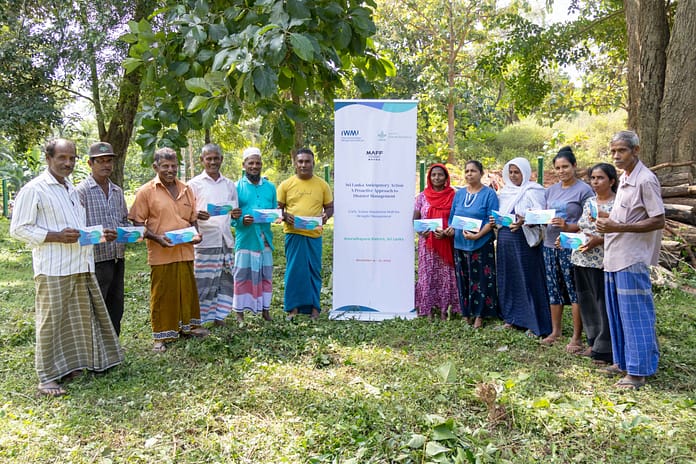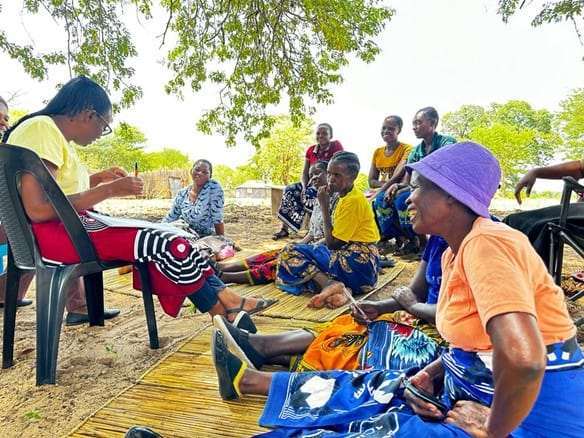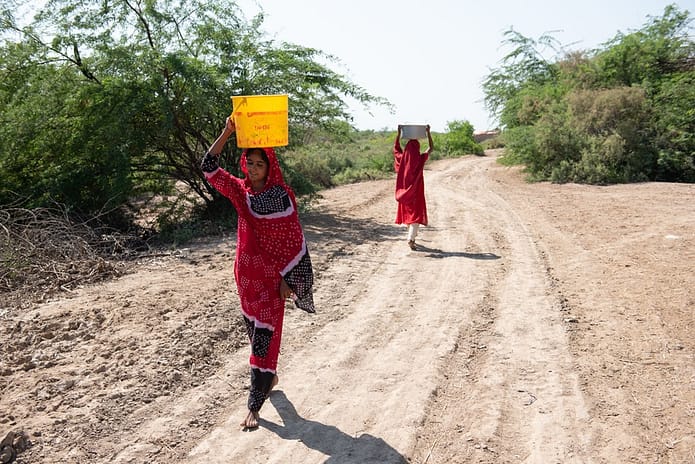By Ngowenani Nohayi, Decide Mabumbo and Juan Carlos-Sanchez

The 2023 floods in Ethiopia left a lasting impact in the Somali Region. Over 51,000 people were displaced, nearly 18,000 households were affected, and critical infrastructure, such as roads, bridges, and irrigation systems, was destroyed. Agricultural livelihoods were hit hard, with thousands of hectares of farmland and livestock lost. Health services were also severely disrupted, leaving communities vulnerable to disease outbreaks due to damaged facilities and poor sanitation.
Recognizing the urgent need for resilience in this fragile context, stakeholders gathered in Jijiga for a two-day workshop to validate the findings of the retrospective analysis of the 2023 floods conducted by International Water Management Institute (IWMI). IWMI in partnership with the Red Cross Red Crescent Climate Centre hosted the workshop with the support of the World Food Programme (WFP) as part of CGIAR Initiative on Fragility, Conflict, and Migration. The workshop aimed to identify critical gaps in early warning systems, early action, and overall disaster preparedness and response. Additionally, the workshop focused on exploring how research and collaboration could transform these insights into proactive and effective solutions.
Key thematic pillars
Central to these conversations were four thematic pillars that emerged as essential pathways for building resilience: Governance and Financing, Forecasting and Dissemination, Locally Led Action and Demand-Driven Research Priorities. These pillars provide a roadmap for addressing the challenges faced by the Somali Region.
The role of governance and financing
Resilience starts with strong governance and sustainable funding. Participants emphasized the importance of strong governance structures and sustainable financing to support Anticipatory Action (AA).
Governance and financing are the twin pillars of resilience. Without clear frameworks and sustainable funding, even the most robust plans fail to be implemented. Our focus must remain on building institutional capacity and fostering partnerships that prioritize both equity and sustainability.”-
Representative from the Ministry of Water and Energy
Participants further stressed the importance of aligning disaster management policies with the realities of the Somali Region, where fragility and conflict pose additional challenges.
Discussions further highlighted the need for clearer policy guidelines from the government to ensure effective implementation of AA. Financing emerged as another critical factor, with calls for innovative solutions like public-private partnerships and risk-based insurance schemes to mobilize resources. Participants called for capacity building and equipping local governments and communities to act decisively in the face of disasters.
Bridging the gap between early warning and early action
Our communities rely on ‘dignin’ (local warnings) to understand what is coming, but today we also need modern forecasts to prepare better. When these work together, we can act in time to protect our families and livelihoods.
Community leader
Accurate forecasting is essential, but its true value lies in delivering timely and actionable information to the right people. The workshop highlighted key gaps in early warning dissemination, including ineffective channels that fail to reach all at-risk individuals and challenges in interpreting forecast data to trigger early action. Despite these challenges, participants acknowledged the efforts of the Ethiopian Meteorology Institute to provide capacity-building training to local bureaus. These initiatives aim to enhance the ability of technical staff and communities to interpret and act on forecasts effectively.
Participants emphasized the importance of integrating scientific tools with traditional knowledge systems, such as “dignin” (local warnings), to build trusted and culturally relevant early warning systems and continuous skill development particularly in Impact-Based Forecasting. This approach shifts the focus from weather conditions to their specific impacts, making forecasts more responsive to needs, accessible and actionable. IBF has the potential to empower communities, optimize resource distribution during emergencies, and support long-term resilience through better infrastructure planning and climate adaptation strategies.
Empowering communities through locally led action
The resilience of the Somali Region is deeply rooted in its communities, with numerous initiatives already being led by the government and humanitarian actors. Discussions at the workshop stressed the importance of building on these existing efforts and ensuring that solutions are locally driven. Key points included:
- Community ownership: the communities directly impacted design and lead interventions, integrating indigenous knowledge and local priorities.
- Practical solutions: Expand successful grassroots initiatives, such as village savings groups, water conservation projects, and other locally adapted solutions to strengthen disaster preparedness.
- Inclusivity: Actively engage marginalized groups, particularly women and youth, in decision-making processes to ensure more equitable outcomes and draw on diverse perspectives for effective solutions.
Research priorities: Evidence as a driver of action
I must commend IWMI for being brave and conducting such research in the Somali Region. The focus has always been on AA in drought, but IWMI’s analysis on floods shows the need to step out of our comfort zone. It is important for us to reflect on what we did right but also what we did wrong. Let us also acknowledge that while floods are destructive, they are also beneficial for some communities. Together, let us explore such research studies further.
World Food Programme representative
Participants outlined demand-driven research priorities for the Somali Region, including:
- Long-term resilience building: Research should focus on guiding protective infrastructure, investing in durable water points and flood-resistant structures, and supporting livelihood recovery to reduce future vulnerabilities and enhance resilience in affected areas.
- Governance and local context: Explore how governance structures and socio-economic dynamics shape disaster responses and influence resilience outcomes.
- Disaster preparedness and response: Explore Shock-Responsive Anticipatory Action and Integrated Trigger Models
- Livelihoods and gender: Investigate the unique vulnerabilities and contributions of women, pastoralists, and other key groups in resilience-building efforts.
- Cost-benefit analyses: Demonstrate the economic value of Anticipatory Action to bolster advocacy and secure critical funding for disaster preparedness initiatives.
- Adaptive land and water management: Examine how adaptive land and water management strategies can address tensions over limited resources, grazing land, and water access, while promoting equitable solutions that support resilience and reduce conflicts.
Research must not remain confined to academic circles but must be accessible and actionable for decision-makers and communities alike. Bridging this gap is essential to ensuring that evidence informs strategies that protect lives, livelihoods, and resources. This principle is exemplified by the joint IWMI-WFP-stakeholders’ co-production of policy briefs, which demonstrates how collaborative efforts can translate research into practical, impactful solutions.

Looking ahead: Turning insights into action
The validation workshop marked an important milestone, but the journey to resilience in the Somali Region is just beginning. Building on the discussions and outcomes, the focus now shifts to strengthen investment in AA and disaster preparedness.
As a representative from the Disaster Risk Management Bureau summarized: “The floods taught us harsh lessons, but they also showed us the strength of coming together. With this Community of Practice, we have a chance to prepare for the future instead of just reacting to it.”
The workshop catalyzed the Somali Region’s Anticipatory Action Community of Practice (AA CoP), a network designed to drive collaboration, mobilize resources, and advance locally led initiatives. By building on lessons from the 2023 floods, the AA CoP aims to become a model for resilience in fragile settings.
Next steps
- Operationalize the AA CoP by fostering knowledge exchange through national dialogues, linking local efforts to global platforms like the Anticipation Hub to ensure long-term sustainability and impact.
- Mobilize resources through innovative financing mechanisms and strengthened partnerships to support resilience-building efforts.
- Leverage the successful implementation of AA by WFP to package best practices, including early warning system integration, resource mobilization strategies, and community-led interventions, to guide future actions in the Somali Region.





